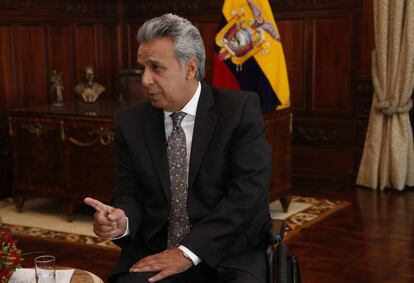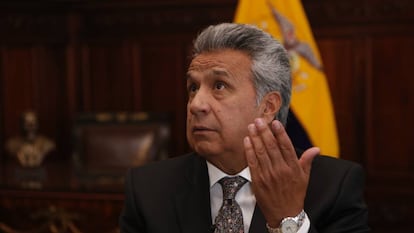Ecuador president: “Julian Assange has no right to intervene in the politics of our sister countries”
Lenín Moreno spoke with EL PAÍS about his project for Ecuador and about the Catalan crisis


Lenín Boltaire Moreno (born in Quito in 1953) has just completed his first six months as president of Ecuador after taking the reins from his charismatic but controversial predecessor Rafael Correa. Although both men are members of the left-wing PAIS Alliance, Moreno has followed his own path, incurring the ire of Correa who, from his new home in Brussels, has been engaged in a campaign to erode his successor’s prestige and has even threatened to return to the front lines of Ecuadorian politics.
Rafael Correa is just another opponent. Nothing more
Moreno, who has been on an official trip to Spain this week, recently received EL PAÍS at the seat of government, Carondelet Palace in Quito. During the interview he spoke of his plans for Ecuador and his differences with Correa, as well as Wikileaks founder Julian Assange’s involvement in the Catalan independence issue. Last week, vice president Jorge Glas was sentenced to six years in prison for his role in the Odebrecht corruption case which has implicated officials all across Latin America in a kickbacks scheme centered on the Brazilian construction giant.
Question. You have just completed your first six months in office. Has Correa become your greatest opponent during this time?
“Assange does not have the right to intervene in Catalonia”

Q. Wikileaks founder Julian Assange interfered in the crisis in Catalonia from your embassy in London. Is this allowed?
A. We are very respectful of the sovereignty of each country. Under no circumstances do we want to interfere in the situation in Catalonia. We hope the conflict will be resolved as soon as possible to the benefit of all Spaniards. We have reminded Assange that he cannot interfere in Ecuadorian politics because his status as a political refugee doesn't allow it. He does not have the right to interfere in Ecuadorian politics or the politics of the countries we are friends with, and he has pledged not to do this. Ecuador granted Assange asylum because we really believed his life was in danger. But now we have to remind him of this fact, that the generosity of the Ecuadorian people and its government under no circumstance gives him the right to intervene in the politics of our sister countries.
Q. Is there a way out of the terrible crisis in Venezuela?
A. Let me reiterate our respect for sovereignty and self-determination. I don't think intervention is an option. That would just polarize each side. Each country finds its own path to democracy. I see there is an eagerness to converse with the opposition sector and I welcome this. That said, I have not stopped expressing my concern for the many deaths that have occurred. Democracy must be expressed freely and by all that is why we have raised our concerns in international forums like the OAS, UNASUR and United Nations.
Answer. Those who can really judge the work we have done are not us, but the people of Ecuador, a majority of whom – almost 80% [according to the polls] – are in favor. We have taken a new approach to our relation with the professional sectors, the producers’ associations, with workers’ collectives, with politicians and with the population in general, as well as with the media – a new approach favoring dialogue, not imposition. Favoring agreements, reaching minimum agreements. Our main opposition is the lack of economic reactivation, the immense debt we were left with, the amount of uncompleted infrastructure. Our biggest opposition is poverty, unemployment, lack of motivation and confrontation. Rafael Correa is just another opponent. Nothing more.
Q. Ecuador has massive debt and its economic plan has been criticized for not being different from previous plans.
A. This is the project with which we won the elections. We have to keep that in mind. However, I believe that the final stages of the government of the economist Rafael Correa were short on self-criticism, renewal and innovation. Criticism allows us to establish honest criteria in relation to what we have done badly and what we can do as we go forward: and self-criticism even more so. We have a plan to reactivate the economy. The Assembly has sent us some changes. The president of Ecuador has the right to veto these changes and return them to the Assembly. Without doubt some aspects will be vetoed, they will be sent back to the Assembly, and at that moment we hope that everything will be approved and within that framework we can fully carry out our work.
Q. Jorge Glas [who has already been tried] was implicated in the Odebrecht case. Why was he still vice president?
A. When we put forward our plan, we spoke of facing corruption head on. This has many aspects. The first is the autonomy of public agencies: ensuring that the comptroller, public prosecutors and judicial power are totally independent. Orders are not issued by the executive. We did not want to run the risk of becoming like the previous government, where what the executive thought was a type of order for all the state agencies. I chose Glas as candidate without knowing what he had been doing. There has been corruption, a lot of corruption. It was wrongly said that this was Ecuador’s most honest government. But it wasn’t. That doesn’t mean that previous governments were better. Corruption has been a prevailing theme in Ecuador's history.
Q. Correa had a tense relationship with the media. Do you plan to change the media law?
A. We are planning to review it, not withdraw it, because it has a lot of positive aspects. But there are other areas we are committed to changing, like the fact of having a governing communications body, which far from acting as a promoter of educational activities or an advisory organization, has acted as a sanctioning body. The relationship with the media, just like relationships with citizens, unions and political parties, is one of tolerance, respect and the understanding that whoever is engaged in a public activity should accept that they are going to be scrutinized. And that's the way it should be.
English version by George Mills and Melissa Kitson.
Tu suscripción se está usando en otro dispositivo
¿Quieres añadir otro usuario a tu suscripción?
Si continúas leyendo en este dispositivo, no se podrá leer en el otro.
FlechaTu suscripción se está usando en otro dispositivo y solo puedes acceder a EL PAÍS desde un dispositivo a la vez.
Si quieres compartir tu cuenta, cambia tu suscripción a la modalidad Premium, así podrás añadir otro usuario. Cada uno accederá con su propia cuenta de email, lo que os permitirá personalizar vuestra experiencia en EL PAÍS.
¿Tienes una suscripción de empresa? Accede aquí para contratar más cuentas.
En el caso de no saber quién está usando tu cuenta, te recomendamos cambiar tu contraseña aquí.
Si decides continuar compartiendo tu cuenta, este mensaje se mostrará en tu dispositivo y en el de la otra persona que está usando tu cuenta de forma indefinida, afectando a tu experiencia de lectura. Puedes consultar aquí los términos y condiciones de la suscripción digital.








































